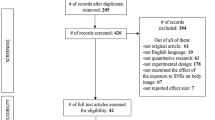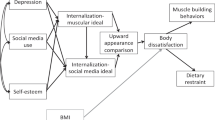Abstract
Research on objectification theory (Fredrickson and Roberts in Psychology of Women Quarterly 21:173–206, 1997) has demonstrated relations among self-objectification, body shame, and negative health outcomes. Less research has focused on the relation of self-objectification to indicators of well-being. We examined associations among self-objectification, body shame, and two indicators of well-being (i.e., self-esteem and satisfaction with life) in a path analytic model. We also tested explicitly whether body shame mediated the relation between self-objectification and self-esteem and whether self-esteem mediated the relation between body shame and life satisfaction. Female undergraduates (N = 227) from the United States completed questionnaires assessing the constructs of interest. Results indicated that the proposed model fit the data and that body shame and self-esteem mediated as predicted. Implications of these findings are discussed.


Similar content being viewed by others
References
Arbuckle, J. L. (2003). Amos (Version 5.0) [Computer Software]. Chicago: SmallWaters Corporation.
Baron, R. M., & Kenny, D. A. (1986). The moderator-mediator variable distinction in social psychological research: Conceptual, strategic and statistical considerations. Journal of Personality and Social Psychology, 51, 1173–1182.
Baumeister, R. F., Campbell, J. D., Krueger, J.I., & Vohs, K. D. (2003). Does high self-esteem cause better performance, interpersonal success, happiness, or healthier lifestyles. Psychological Science in the Public Interest, 4, 1–44.
Beck, A. T., Brown, G. K., Steer, R. A., Kuyken, W., & Grisham, J. (2001). Psychometric properties of the Beck Self-Esteem Scales. Behavior Research and Therapy, 39, 115–124.
Blascovich, J., & Tomaka, J. (1991). Measures of self-esteem. In J. P. Robinson, P. R., Shaver, & L. S. Wrightsman (Eds.), Measures of Personality and Social Psychological Attitudes: Volume 1 in Measures of Social Psychological Attitudes Series (pp. 115–160). San Diego, CA: Academic.
Brown, J. D. (1998). The self. Boston: McGraw-Hill.
Chow, H. P. (2005). Life satisfaction among university students in a Canadian prairie city: A multivariate analysis. Social Indicators Research, 70, 139–150.
Crawford, M., & Unger, R. (2004). Women and gender: A feminist psychology. Boston: McGraw-Hill.
Diener, E. (1984). Subjective well-being. Psychological Bulletin, 95, 542–575.
Diener, E., Emmons, R., Larsen, J., & Griffin, S. (1985). The satisfaction with life scale. Personality Assessment, 49, 71–75.
Diener, E., Sapyta, J. J., & Suh, E. (1998). Subjective well-being is essential to well-being. Psychological Inquiry, 9, 33–37.
Emmons, R. A., & Diener, E. (1985). Personality correlates of subjective well-being. Personality and Social Psychology Bulletin, 11, 89–97.
Frederickson, B. L., & Roberts, T. (1997). Objectification theory: Toward understanding women’s lived experiences and mental health risks. Psychology of Women Quarterly, 21, 173–206.
Fredrickson, B. L., Roberts, T., Noll, S. M., Quinn, D. M., & Twenge, J. M. (1998). That swimsuit becomes you: Sex differences in self-objectification, restrained eating, and math performance. Journal of Personality and Social Psychology, 75, 269–284.
Furnham, A., & Cheng, H. (2000). Lay theories of happiness. Journal of Happiness Studies, 1, 227–246.
Garrow, J. S., & Webster, J. (1985). Quetelet’s index (w/h2) as a measure of fatness. International Journal of Obesity, 9, 147–153.
Greenleaf, C. (2005). Self-objectification among physically active women. Sex Roles, 52, 51–62.
Harter, S. (1993). Causes and consequences of low self-esteem in children and adolescents. In R. Baumeister (Ed.), Self-esteem: The puzzle of low self-regard (pp. 87–116). New York: Plenum.
Hong, S., & Giannakopoulos, E. (1994). The relationship of satisfaction with life to personality characteristics. Journal of Psychology, 128, 547–558.
Jahoda, M. (1958). Current Concepts of Positive Mental Health. New York, NY: Basic Books.
Judge, T. A., Bono, J. E., & Locke, E. A. (2000). Personality and job satisfaction: The mediating role of job characteristics. Journal of Applied Psychology, 85, 237–249.
Keyes, C. L. (2005). Mental Illness and/or mental health: Investigating axioms of the complete state model of health. Journal of Counseling and Clinical Psychology, 73, 539–548.
Kostanski, M., & Gullone, E. (1998). Adolescent body image dissatisfaction: Relationship with self-esteem, anxiety, and depression, controlling for body mass. Journal of Child Psychology and Psychiatry, 39, 255–262.
Landrine, H., Klonoff, E. A., Gibbs, J., Manning, V., & Lund, M. (1995). Physical and psychiatric correlates of gender discrimination: An application of the schedule of sexist events. Psychology of Women Quarterly, 19, 473–492.
Lewis, M. (1992). Shame: The exposed self. Ney York: Free Press.
Lowery, S. E., Kurpis, S. E., Befort, C., Banks, E., Sollenberger, S. Nicpon, M. F., et al. (2005). Body image, self-esteem, and health-related behaviors among male and female first year college students. Journal of College Student Development, 46, 612–623.
Mackinnon, D. P., Warsi, G., & Dwyer, J. H. (1995). A simulation study of mediated effect measures. Multivariate Behavioral Research, 30, 41–62.
Mann, M., Hosman, C. M., Schaalma, H. P., & de Vries, N. K. (2004). Self-esteem in a broad-spectrum approach for mental health promotion. Health Education Research, 19, 357–372.
Masten, A. S., & Coatsworth, J. D. (1998). The development of competence in favorable and unfavorable environments: Lessons from research on successful children. American Psychologist, 53, 205–220.
McKinley, N. M. (1998). Gender differences in undergraduates’ body esteem: The mediating effect of objectified body consciousness and actual/ideal weight discrepancy. Sex Roles, 39, 113–123.
McKinley, N. M. (1999). Women and objectified body consciousness: Mothers’ and daughters’ body experience in cultural, developmental, and familial context. Developmental Psychology, 35, 760–769.
McKinley, N. M., & Hyde, J. S. (1996). The objectified body consciousness scale. Psychology of Women Quarterly, 20, 181–215.
Moradi, B., & Subich, L. M. (2002). Perceived sexist events and feminist development attitudes: Links to women’s psychological distress. The Counseling Psychologist, 30, 44–65.
Moradi, B., Dirks, D., & Matteson, A. V. (2005). Roles of sexual objectification experiences and internalization of standards of beauty in eating disorder symptomatology: A test and extension of objectification theory. Journal of Counseling Psychology, 52, 420–428.
Muehlenkamp, J. J., & Saris-Baglima, R. N. (2002). Self-objectification and its psychological outcomes for college women. Psychology of Women Quarterly, 26, 371–379.
Muehlenkamp, J. J., Swanson, J. D., & Brausch, A. M. (2005). Self-objectification, risk-taking, and self-harm in college women. Psychology of Women Quarterly, 29, 24–32.
Noll, S. M., & Fredrickson, B. L. (1998). A mediational model linking self-objectification, body shame, and disordered eating. Psychology of Women Quarterly, 22, 623–636.
Overholser, J. C., Adams, D. M., Lehnert, K. L., & Brinkman, D. C. (1995). Self esteem deficits and suicidal tendencies among adolescents. Journal of American Academy Child and Adolescent Psychiatry, 34, 919–928.
Parkerson, G. R., Broadhead, W. E., & Tse, C. J. (1990). The health status and life satisfaction of first year medical students. Academic Medicine, 65, 586–588.
Pavot, W., & Diener, E. (1993). Review of the Satisfaction with Life Scale. Psychological Assessment, 5, 164–172.
Preacher, K. J., & Hayes, A. F. (2004). SPSS and SAS procedures for estimating indirect effects in simple mediation models. Behavior Research Methods, Instruments, & Computers, 36, 717–731.
Rosenberg, M. (1989). Society and the Adolescent Self-image. Middletown, CT: Wesleyan University Press.
Ross, L., & Nisbett, R. E. (1991). The person and the situation: Perspectives of social psychology. New York: McGraw-Hill.
Ryan, R. M., & Deci, E .L. (2001). On happiness and human potentials: A review of research on hedonic and eudaimonic well-being. Annual Review of Psychology, 52, 141–146.
Ryff, C. D., & Singer, B. (1998). The contours of positive human health. Psychological Inquiry, 9, 1–28.
Ryff, C. D., Keyes, C. L., & Hughes, D. L. (2003). Status inequalities, perceived discrimination, and eudaimonic well-being: Do the challenges of minority life hone purpose and growth? Journal of Health and Social Behavior, 44, 275–291.
Schmitt, D. P., & Allik, J. (2005). Simultaneous administration of the Rosenberg self-esteem scale in 53 nations: Exploring the universal and cultural-specific features of global self-esteem. Journal of Personality and Social Psychology, 89, 623–642.
Sinclair, S. L., & Myers, J. E. (2004). The relationship between objectified body consciousness and wellness in a group of college women. Journal of College Counseling, 7, 150–161.
Sobel, M. E. (1982). Asymptomatic confidence intervals for indirect effects in structural equation models. In Leinhart S (Ed.), Sociological methodology 1982 (pp. 290–312). San Francisco: Jossey-Bass.
Sondhaus, E. L., Kusrtz, R. M., & Strube, M. J. (2001). Body attitude, gender, and self-concept: A 30-year perspective. The Journal of Psychology, 135, 413–429.
Strelan, P., & Hargreaves, D. (2005). Reasons for exercise and body esteem: Men’s responses to self-objectification. Sex Roles, 53, 495–503.
Thompson, J. K., & Altabe, M. N. (1991). Psychometric qualities of the figure rating scale. International Journal of Eating Disorders, 10, 615–691.
Tiggemann, M., & Kurig, J. K. (2004). The role of body objectification in disordered eating and depressed mood. British Journal of Clinical Psychology, 43, 299–311.
Tiggemann, M., & Slater, A. (2001). A test of objectification theory in former dancers and non-dancers. Psychology of Women Quarterly, 25, 57–64.
Tylka, T. L., & Hill, M. S. (2004). Self-objectification as it related to disordered eating among college women. Sex Roles, 51, 719–730.
Wylie, R. C. (1989). Measures of Self-Concept. Lincoln, NE: University of Nebraska Press.
Author information
Authors and Affiliations
Corresponding author
Rights and permissions
About this article
Cite this article
Mercurio, A.E., Landry, L.J. Self-objectification and Well-being: The Impact of Self-objectification on Women’s Overall Sense of Self-worth and Life Satisfaction. Sex Roles 58, 458–466 (2008). https://doi.org/10.1007/s11199-007-9357-3
Received:
Accepted:
Published:
Issue Date:
DOI: https://doi.org/10.1007/s11199-007-9357-3




